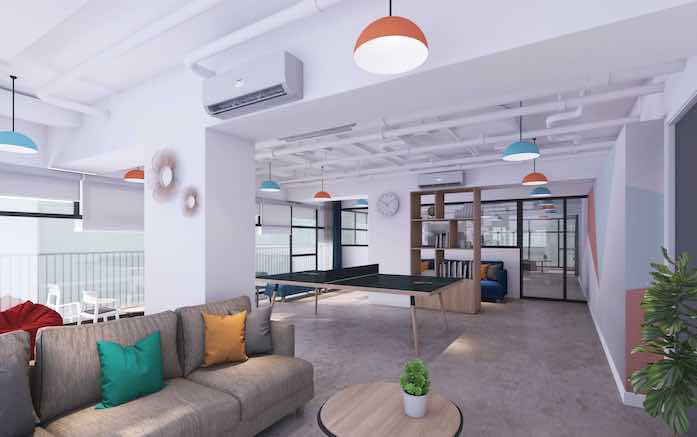
The stage is set for co-living at Weave’s 95-room Weave on Baker
Less than four months after acquiring its third property in Hong Kong, co-living operator Weave has purchased its fourth and largest building in the Asian financial hub, according to sources familiar with the transaction who spoke to Mingtiandi.
The Warburg Pincus-backed company is reportedly the beneficiary owner of BVI-incorporated Anchor Street Investment Limited, which agreed to buy the 141-key Silka West Kowloon Hotel from Golden Wheel Tiandi Holdings for HK$515 million ($66 million), according to a stock exchange announcement by the Nanjing-based developer.
Having acquired the hotel for approximately HK$13,800 per square foot of gross floor area, or the equivalent of HK$3.65 million per key, Anchor Street plans to convert the property into a 250-room co-living location.
The acquisition near the high-speed rail terminus in the city’s West Kowloon area comes as Weave prepares to open a 95-room property in Hung Hom and is the latest in a series of launches by co-living operators in the city within the past 12 months.
Weave Widens Its Net in Hong Kong
Under the terms of the deal, Anchor Street has agreed to acquire one hundred percent of the equity in a shell company that owns the hotel at 48 Anchor Street as well as take on responsibility for an associated shareholders’ loan of approximately HK$179 million.
A deposit of HK$51.5 million has already been paid on the property, with the balance to be settled at completion, which is expected to take place on 31 January 2020.

Sachin Doshi’s Weave has invested $300 mil in Hong Kong co-living
While declining to comment on reports of this latest transaction, Weave’s founder and CEO, Sachin Doshi, told Mingtiandi his company has now invested a total of $300 million into its Hong Kong co-living projects since its inception two years ago.
The 250-room West Kowloon property would expand Weave’s portfolio of existing and planned shared living locations across four of Hong Kong’s key commercial hubs, and would bring its total room count to 625, including the 160-room Weave on Boundary in Prince Edward, the 95-room Weave on Baker in Hung Hom, and an upcoming location in Sheung Wan with a planned 120 rooms.
Located a five-minute walk from the Olympic metro station, the hotel is two stops from the International Finance Centre in Central and a ten minute walk from the shopping hub of Mong Kok.
The high speed rail terminus at Hong Kong West Kowloon Station, which connects Hong Kong to mainland China, is a ten minute drive from the property.
Targeting Untapped Demand
Weave founder Sachin Doshi, speaking to Mingtiandi previously about the opening of Weave on Baker, said that there is a “huge untapped demand” for co-living in Hong Kong due to unaffordable rents in the city and a limited supply of well-designed, good quality studio accommodation.
Rooms at the upcoming Weave on Baker, which is due to open in November, cost up to HK$12,000 per month, which gives residents the use of 2,100 square feet of communal living space spread across two floors including kitchen facilities, a communal living room and a gym.
Just four days ago, rival operator Hmlet announced that it is opening a 57-room location in Mong Kok, the company’s largest en bloc property in Hong Kong, with co-founder Yoan Kamalski saying that expats and “internationally minded locals” are driving demand.
Dubbed Hmlet Zion Apartments, prices start at HK$11,000 per month for a fully furnished room without a bathroom.
Golden Wheel Sells as Hotel Bookings Collapse
Golden Wheel Tiandi is disposing of the hotel just over two and a half years after purchasing the asset from Far East Consortium’s Dorsett Hospitality International for HK$450 million.
The developer said in its bourse filing that it expects to make a gain of approximately HK$70 million from the disposal, with the sale providing a “good opportunity for the group to realise its investment” and inject capital for further development of its hotel business in China.
Golden Wheel Tiandi’s decision to sell coincides with a collapse in hotel bookings in Hong Kong amid four months of on-going social unrest.
According to analysts STR, occupancy in the Asian financial hub’s hotels plunged to 64 percent in August, representing a drop of 30 percent, while revenue per available room almost halved to HK$694.
Just three weeks ago, the city government had to cancel the sale of a commercial site located on Hong Kong’s former airport that required at least 30 percent of the eventual gross floor area to be used for a hotel after all of the bids submitted failed to reach the auction minimum.
Leave a Reply